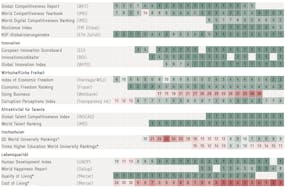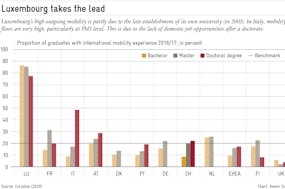ed). The result demonstrated a national cleft on a scale not seen since Switzerland’s vote against membership of the European Economic Area (a sort of halfway house to European Union membership, ed.) more than 20 years ago. The rift separated urban from rural areas, French speaking Switzerland from German speaking regions (and in this case Italian speaking Ticino), and “elites” from the great mass of the people. The priority now will be to achieve the greatest flexibility in domestic and foreign policy in implementing the decision. It is also important not to endanger the elaborate series of bilateral treaties negotiated with the EU (in the wake of the EEA membership rejection, ed).
After the vote: Your spontaneous analysis?
The referendum shows a country divided, on a scale not seen since the EEA vote. It’s a split in three dimensions.
Namely?
Between town and coutnry. Not for the first time, rural areas, which have the least contact with foreigners, came out most strongly against immigration. The exception was Ticino, but the focus there wasn’t on immigration, but rather the thousands of Italians who cross the border every day to work in Switzerland.
And what abouut the Röstigraben? (a hypothetical demarcation line between French and German speaking Switzerland, based on alleged culinary preferences, but widely taken as a culture line of divide,
ed)
That’s the second divide – between French speaking Switzerland and German speaking areas, including Ticino. And on top, there’s a third: between the “elite” – in other words, the government, the business community, almost all the political parties and half the population on the one side, and the narrow majority of voters on the other. The great mass of people failed to follow the “elite”.
Is there now a risk of a lack of leadership?
Of course, these differences can also be interpreted as a lack of leadership. But Switzerland has never been a country that functioned with strong leadership. In our political system (based on an extreme form of direct democracy, ed), it’s always the people who lead. The latest events have just reminded us clearly of that.
The government simply didn’t take the problems associated with immigration seriously enough?
That is the decisive message of this referendum result.
The positive spin would be; in Switzerland, it’s the people who decide.
Every negative event has a positive element. And, after all, it wasn’t primarily a vote on immigration at all.
Sorry?
It was about three things: foreigners, the EU and growth. Or, putting it another way: the result reflected the wish for immigration with limits; for better controls on growth; and for a continuing institutional “distance” between Switzerland and the EU (the latter reflecting mounting pressures for closer institutional links between Bern and Brussels, ed).
So what’s to be done now?
As far as growth is concerned, a lot is up to us. We can, for example, increase building densities in urban areas to relieve the pressure of construction in the countryside. We could introduce mobility pricing to control traffic better. If we want to maintain Switzerland’s quality of life, action is required.
What about immigration?
That’s more difficult, because it involves partners abroad. But even under the existing rules governing the free movement of persons, a lot of the popular concerns could have been relieved by implementing matters more rigidly. There’s no argument immigration has been a plus for Switzerland. After the referendum, though, we’ve got to take people’s concerns seriously and implement restrictions to immigration as broadly as the existing rules allow.
The EU also has a problem with immigration.
This is slowly reaching even parts of Germany. Whether popular discontent will also reach the politicians in Berlin? That would be desirable. The UK is practising restrictive immigration policies. And in France the problems are also obvious. But those places don’t allow popular discontent to be expressed via direct democracy.
Will the EU react?
The free movement of persons is a holy cow for the EU and can barely be discussed. It is tabu. But there are going to be similar irritations among EU citizens as there have been here. Will they lead to the axiom of total freedom of movement for persons being somewhat “adulterated”? I don’t know.
What consequences do you expect?
There will be negative international media attention and sharp reactions. But, we’ve now said “yes” to a constitutional issue, and, as ever, the devil will be in the detail: in the concrete implementation. But there is some scope for flexibility here. It’s now up to the government to see what room for manoeuvre is available. For me, that’s the central question: what room for manoeuvre there is domestically, while still respecting the people’s will, and regarding the EU, without endangering the bilateral treaties.
Would that all be so bad?
Yes, and it would be nothing short of absurd if the SVP, of all people, managed to endanger the bilateral path with this referendum success. After all, it’s the SVP we have to thank for the tailor made packet of treaties with the EU (because Swiss rejection of EEA membership – strongly associated with the fiercely independent SVP – pushed Bern and Brussels into negotiating dozens of separate treaties instead, ed).
If Switzerland were now to find itself in a position where it was confronted with two stark alternatives: either standing completely aloof or joining the EU, and then was obliged to choose, “for better or worse“ for membership, then the “success” of the latest referendum would end up to be a real shot in the foot.
This interview appeared in Blick on 10.2.2014.
With our thanks to Blick for allowing reproduction.





